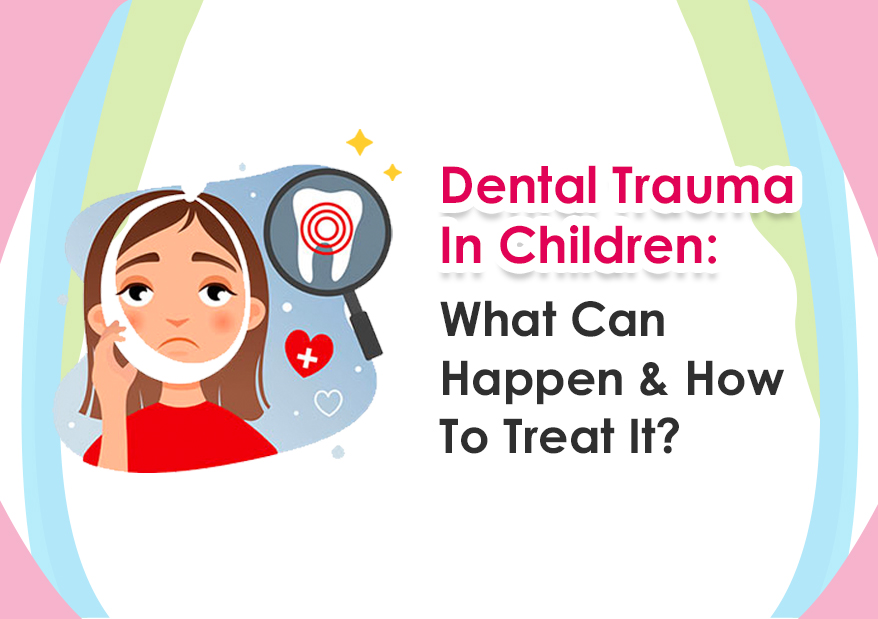Child Knocked Out a Tooth? Emergency Dental Trauma Guide
Your child falls at the playground and hits their face. There’s blood, tears, and a tooth—or part of one—is missing. What do you do?
Dental trauma is one of the most common injuries in childhood. About one-third of children experience dental injury before age 15. The good news: with quick, proper action, many dental injuries can be successfully treated, and even knocked-out permanent teeth can sometimes be saved.
This guide from the pediatric dentists at myPediaClinic in Dubai explains what to do when your child injures a tooth, what types of dental trauma occur, and when you need emergency care.
Types of Dental Trauma in Children
Dental injuries range from minor chips to complete tooth loss. Understanding the type of injury helps you respond appropriately.
1. Chipped or Cracked Tooth
A piece of the tooth breaks off, usually from the corner or edge. This is the most common dental injury.
- Minor chip: Small piece of enamel broken off, no pain
- Moderate chip: Larger piece missing, possibly reaching the dentin (yellow layer), may be sensitive
- Severe fracture: Break exposes the pulp (nerve), visible as pink or red spot, painful
2. Loose Tooth (Luxation)
The tooth is still in place but has been moved or loosened by the impact.
- Concussion: Tooth is tender but not loose or displaced
- Subluxation: Tooth is loose but hasn’t moved from its position
- Lateral luxation: Tooth is pushed sideways, often still attached to the gum
- Extrusion: Tooth is partially pulled out of the socket
- Intrusion: Tooth is pushed into the jawbone (looks shorter than neighboring teeth)
3. Knocked-Out Tooth (Avulsion)
The tooth is completely out of the socket. This is a dental emergency, especially for permanent teeth.
4. Root Fracture
The root of the tooth is broken below the gum line. The crown may appear loose or displaced. This requires X-ray to diagnose.
5. Jaw Fracture
A more severe injury affecting the jawbone. Signs include inability to open or close the mouth properly, severe pain, swelling, or misaligned bite.
Emergency Steps: What to Do Right Away
Step 1: Stay Calm
Your child is scared and in pain. They need you to be calm and reassuring. Dental injuries look scary (lots of blood) but are often treatable.
Step 2: Control the Bleeding
- Have your child rinse gently with water
- Apply gentle pressure with a clean cloth or gauze
- For lip or gum cuts, apply a cold compress to reduce swelling
Step 3: Assess the Injury
- Is it a baby tooth or permanent tooth?
- Is the tooth chipped, loose, or completely out?
- Can you find the tooth or tooth fragment?
- Is there severe pain, significant swelling, or inability to close the mouth?
Step 4: Handle the Tooth Properly
If a permanent tooth is knocked out:
- Find the tooth—search the ground, clothing, or mouth
- Handle it by the crown (white part), never touch the root
- If dirty, rinse gently with milk or saline (not water, don’t scrub)
- Try to replant it—if possible, place it back in the socket and have your child bite on a cloth to hold it in place
- If you can’t replant it, store the tooth in milk, saline, or saliva (have your child hold it in their cheek if old enough not to swallow)
- Get to a dentist immediately—every minute counts. Best outcomes are within 30-60 minutes
If a baby tooth is knocked out:
Do NOT replant it. Replanting baby teeth can damage the developing permanent tooth underneath. Save the tooth to show the dentist, but reimplantation won’t be done.
Step 5: Seek Dental Care
Contact your dentist or emergency dental clinic immediately for:
- Any knocked-out permanent tooth
- Severe tooth fracture with visible pink/red (exposed nerve)
- Tooth pushed into the gum or significantly displaced
- Suspected jaw injury
- Severe or uncontrolled bleeding
For minor chips or slightly loose teeth, schedule an appointment within 24-48 hours.
Treatment for Different Dental Injuries
Chipped Tooth Treatment
- Minor chip: The dentist may smooth the edge or apply a tooth-colored filling to restore the shape
- Moderate chip: Filling or bonding to rebuild the tooth structure
- Severe chip (exposed pulp): May need pulp treatment (pulpotomy or root canal) followed by a crown
Loose Tooth Treatment
- Slightly loose: Often monitored; the tooth usually tightens on its own. Soft diet recommended.
- Significantly loose or displaced: May be splinted (attached to neighboring teeth) to stabilize while it heals
- Intruded tooth: Depending on severity, may be allowed to re-erupt on its own, repositioned, or extracted
Knocked-Out Tooth Treatment
Permanent tooth:
- If replanted quickly and properly, there’s a good chance of survival
- The tooth is cleaned, repositioned, and splinted
- Root canal treatment is usually needed later
- Follow-up care monitors for complications
Baby tooth:
- Not replanted
- A space maintainer may be recommended to hold the space for the permanent tooth
Root Fracture Treatment
- Depends on location and severity of fracture
- May be splinted and monitored
- Sometimes extraction is necessary
Baby Teeth vs. Permanent Teeth: Why It Matters
Treatment differs significantly based on whether the injured tooth is a baby tooth or permanent tooth.
How to Tell the Difference
- Baby teeth: Smaller, whiter, rounder edges, present from about age 6 months to 12 years
- Permanent teeth: Larger, slightly more yellow, may have ridged edges (mamelons), begin appearing around age 6
General timeline:
- Children under 6 usually have all baby teeth
- Ages 6-12: mix of baby and permanent teeth
- After 12: mostly permanent teeth
Why Baby Tooth Injuries Are Treated Differently
Baby teeth have different root structures and are positioned near developing permanent teeth. Aggressive treatment of baby teeth can damage the permanent teeth forming beneath them.
This is why knocked-out baby teeth aren’t replanted—the procedure could harm the permanent tooth. However, baby tooth injuries still need evaluation, as damage to the permanent tooth underneath can occur from the initial impact.
Complications and Follow-Up Care
Dental trauma can have delayed effects. Even after initial treatment, watch for:
Signs of Complications
- Color change: The tooth turns gray, dark, or yellow—this may indicate pulp damage
- Gum swelling or bump: May indicate infection or abscess
- Increasing pain: Pain that worsens days after injury suggests complications
- Loose tooth: A tooth that becomes loose after initially stabilizing
- Sensitivity: Prolonged sensitivity to hot, cold, or pressure
Why Follow-Up Is Essential
The dentist will schedule follow-up appointments to monitor healing. Some complications, like root resorption or pulp death, develop weeks or months after injury. Regular monitoring catches problems early.
Possible Long-Term Effects
- Pulp necrosis: The tooth nerve dies and may need root canal treatment
- Root resorption: The body absorbs the tooth root (may lead to tooth loss)
- Ankylosis: The tooth fuses to the bone (affects growth)
- Damage to permanent teeth: Injuries to baby teeth can affect developing permanent teeth—may cause discoloration, pitting, or malformation
Preventing Dental Injuries
While you can’t prevent all accidents, you can reduce the risk:
Mouthguards
Custom-fitted mouthguards significantly reduce dental injuries during sports. They should be worn for:
- Contact sports (football, hockey, martial arts)
- Activities with fall risk (skateboarding, cycling, gymnastics)
- Ball sports (basketball, baseball, soccer)
Custom mouthguards from your dentist offer better protection and fit than store-bought options.
Safety Measures at Home
- Use safety gates and remove hazards for toddlers
- Enforce no running indoors rules
- Supervise young children around pools, furniture edges, and stairs
- Ensure proper car seat use
Address Risk Factors
Children with protruding front teeth (overjet) are at higher risk for dental injury. Early orthodontic consultation can address this.
When to Go to the Emergency Room
Go directly to the ER (not dentist) if:
- Your child lost consciousness, even briefly
- There’s severe or uncontrolled bleeding
- You suspect a broken jaw
- There are signs of head injury (confusion, vomiting, unequal pupils)
- Your child has difficulty breathing
- The injury involved more than the mouth/teeth
For dental-only injuries, a dentist or emergency dental clinic is usually the better choice for specialized care.
Frequently Asked Questions About Dental Trauma
How quickly do I need to get to a dentist for a knocked-out tooth?
Time is critical. For permanent teeth, the best outcomes occur when the tooth is replanted within 30 minutes. After 60 minutes, the chance of successful reimplantation decreases significantly. Call ahead so the dental team can prepare.
Should I put a knocked-out tooth in water?
No. Water damages the cells on the root surface. Store the tooth in milk, saline, or saliva. Milk is ideal because it’s usually available and keeps root cells alive for 1-2 hours.
My child’s tooth got pushed up into the gum. What should I do?
This is called intrusion and needs prompt dental evaluation. Don’t try to pull it back down. For baby teeth, it may be left to re-erupt on its own. For permanent teeth, treatment depends on severity and the stage of root development.
Will a chipped baby tooth need treatment?
Minor chips often need only smoothing. Larger chips may need filling. If the nerve is exposed, treatment is needed to prevent infection. Your dentist will recommend the best approach.
My child’s injured tooth is turning gray. What does this mean?
Color change often indicates damage to the blood supply or nerve. Sometimes the color improves over time; other times it indicates the tooth is dying and may need treatment. See your dentist for evaluation.
Can a cracked tooth heal on its own?
No. Unlike bones, teeth don’t heal themselves. A cracked tooth needs dental treatment to prevent the crack from worsening and to restore function. Without treatment, bacteria can enter and cause infection.
How do I know if my child’s injury affected the permanent tooth underneath?
Damage to permanent teeth from baby tooth trauma may not be visible for years—until the permanent tooth erupts. Signs include discoloration, pitting, enamel defects, or malformed teeth. Regular dental checkups help monitor this.
My child’s loose tooth has tightened up. Do we still need to see the dentist?
Yes. Even teeth that seem to heal on their own should be evaluated. X-rays can reveal root fractures or other issues that aren’t visible. Follow-up monitors for delayed complications.
What if we can’t find the tooth piece that broke off?
If the piece might have been swallowed, it will likely pass without issue. If you’re concerned it might have been inhaled (rare), or if there are missing pieces in lip or soft tissue wounds, seek medical attention for an X-ray.
Should every child wear a mouthguard for sports?
Mouthguards are recommended for any sport with risk of contact or falls. Custom mouthguards offer the best protection. Even recreational activities like cycling and skateboarding benefit from mouth protection.
Can dental trauma affect my child’s bite or jaw development?
Severe injuries, especially those involving intrusion or early tooth loss, can potentially affect jaw development. This is why follow-up care is important—the dentist monitors for any growth-related issues.
How do I care for my child’s mouth after a dental injury?
Follow your dentist’s specific instructions. Generally: soft diet for 1-2 weeks, careful tooth brushing (gently around injured area), use prescribed medications, avoid biting on the injured tooth, and attend all follow-up appointments.
Emergency Contacts and Resources
Know your resources before an emergency happens:
- Save your pediatric dentist’s emergency number in your phone
- Know the nearest emergency dental clinic and their hours
- Keep milk cartons or a tooth-saving solution in your first aid kit
- If traveling, research local dental emergency services
Get Help for Your Child’s Dental Injury
Dental injuries are stressful, but most can be successfully treated—especially with prompt care. If your child has experienced dental trauma, don’t wait.
At myPediaClinic’s pediatric dental center, our team is experienced in treating dental emergencies in children. We provide compassionate care to help your child heal and restore their smile.
Contact us for emergency dental care or to schedule a follow-up appointment after a dental injury.





